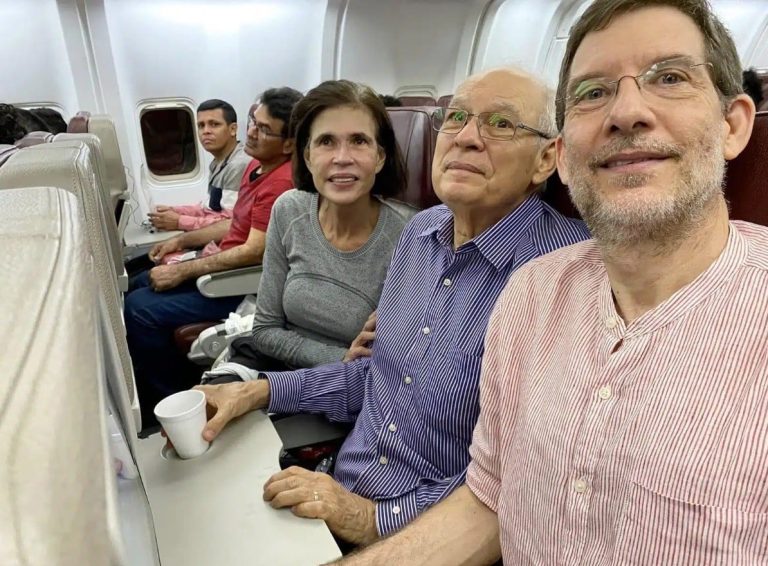10 de febrero 2023

European Concern over Lack of Academic Freedom in Nicaragua

PUBLICIDAD 1M
PUBLICIDAD 4D
PUBLICIDAD 5D
God writes the lines of freedom crookedly, but with the right letters. And this is only the first page. The best pages are yet to come

God writes the lines of freedom crookedly
The vast majority of the political prisoners who were suffering in the prisons of the Ortega dictatorship for fabricated crimes they never committed, under repressive laws, have been released. They were put on a charter plane and sent at dawn to exile. It was the same arbitrary way they were captured and subjected to trials that never had any legal value, and kept in horrid jail conditions, a small number of them confined to their homes.
I just saw a government video in which a robed magistrate, president of the Managua Court of Appeals, reads in a cavernous voice, in an empty room in the Judicial Complex, the sentence whereby the prison verdict is changed for the punishment of banishment. And they are stripped, additionally, in perpetuity, of all their political and citizen’s rights for treason to the homeland, another arbitrary act without any basis whatsoever.
Shortly after, the National Assembly convened urgently, and approved in unanimous obedience a decree to strip the Nicaraguan nationality from the traitors. That was, to those already exiled in-flight, in an act against the Constitution. More arbitrariness. They forget that laws are not retroactive by universal principle, even if it were a constitutional law, but in Nicaragua universal principles are no longer valid.
Exiled, stateless, but free. God writes the lines of freedom crookedly, but with the right letters. And this is only the first page. The best pages are yet to come.
They deprived them of their nationality to please the ears of their enraged fanatics, blind militants, paramilitaries bound with blood in the repression, who must be confused. They have been used to the angry discourse, hammered every day, that these are traitors to the homeland, terrorists responsible for the failed coup d’état of 2018, that would never see the light of day. That has been the official discourse. Traitors, terrorists, garbage, sellouts. But they saw it, they saw freedom. Just as one day the entire country will see it.
All the political prisoners under the dictatorship, those who boarded the plane that took them to exile, and those who stayed, we still don’t know why, are exemplary Nicaraguans. They resisted with dignity for long months the solitary confinement in punishment cells, and made of the prison their trench of struggle, a prison where they should never have been. Brave men and women, political, union and peasant leaders, human rights defenders, business executives, journalists, student leaders, lawyers, scholars, Catholic priests, and even a bishop, head of the Dioceses of Matagalpa and Esteli, Monsignor Rolando Alvarez, a prophetic voice of truth.
All of them, accused of a crime taken out of a shyster’s sleeve, “undermining national sovereignty,” a sovereignty seized by a couple, by the family in power, an old revolutionary party turned into a parody of a dream that failed so long ago.
They were never subjugated. They never lowered their heads in front of spurious judges in the Orwellian hearings. They wore the prisoner uniforms without detriment to their integrity and gave an example of decency to a country silenced by force, which meanwhile sees thousands leaving through blind spots across its borders, fleeing from repression, in silence, in fear. Nicaragua is a country that has not yet awakened from its long nightmare, after another even more savage dictatorship. However, when the plane taking the exiled prisoners took off, it was celebrated intimately, as a small joy, even though they know it is far from the final goal of freedom and democracy.
It was always clear that these political prisoners were hostages. The dictatorship, facing a growing international isolation, wanted to keep this bargaining chip, the only possible one, the prisoners in exchange for something: the economic sanctions imposed by the United States, the European Union, Canada, Switzerland, Great Britain, both on government entities and public and private companies linked to the regime, as well as police and government officials and members of the dictatorial family.
Did they get any of that? We still don’t know yet what they got in return. The special flight in which the hostages traveled was bound for Washington Dulles Airport. But the State Department hastened to clarify, in a statement to Congress, that it was a unilateral decision by Ortega, “his own decision,” and they urged him to take other steps to restore democracy and freedom in Nicaragua, without recognizing any agreement.
Anyway, the dictatorship has been left empty-handed. Its best strategy would have been to negotiate the hostages in batches, and not to release them all at once, in order to keep some cards at hand. A bad sign as far as they are concerned. And releasing them is not a sign of strength, but of weakness. This is evidenced by declaring them stateless, a final revenge, now that they are out of reach of their claws, as if their decrees, and the sentences and laws of their minions, judges and deputies, would have value in perpetuity, and Nicaragua would continue under their iron rule forever.
These exiled are more Nicaraguan than ever before.
Original text published in El País.
This article was originally published in Spanish in Confidencial and translated by Havana Times.
PUBLICIDAD 3M
Escritor, periodista, político y abogado nicaragüense, exiliado en España. Premio Alfaguara de Novela (1998). Presidente fundador del encuentro literario Centroamérica Cuenta (2012). Primer centroamericano en ganar el Premio Cervantes (2017). Medalla de Oro del Círculo de Bellas Artes de Madrid (2021). Fue vicepresidente de Nicaragua de 1985 a 1990.
PUBLICIDAD 3D